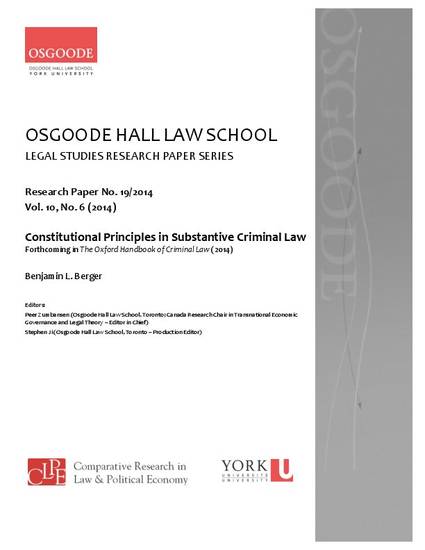
- Constitutional Law,
- Criminal Law,
- Sovereignty,
- Proportionality,
- Mercy,
- Legal Subject,
- Fault,
- Punishment,
- Defences
Since Milsom’s famous dismissal of the “miserable history of crime in England,” criminal law has undergone a revolution in constitutional significance. The rise of rights constitutionalism as the heart of the modern liberal rule of law has given criminal law a new life in which it is subject to substantial justice-based innovation through appeal to the internal and basic norms of the legal system itself. Far from the marginal and exceptional status once ascribed to it by Milsom, this chapter argues that criminal law is now best understood and approached as a species of constitutional reflection. Substantive criminal law has become a laboratory for the constitutional, focussing and advancing classic questions of constitutional concern, while at the same time traditional questions of criminal law theory have themselves begun to translate into a constitutional register. Thematically, this chapter considers the way in which substantive criminal law has become a site for reflection on sovereignty and state violence; the anthropology of the legal subject; the rule of proportionality; and the relationship between judgment, discretion, and mercy. The chapter then turns to the constitutionalization of questions of the limits of the criminal law, fault, criminal defences, and standards for punishment. Juridical exploration of the relationship between substantive criminal law and constitutional principles has been uneven across national traditions; accordingly, this chapter draws significantly from the Canadian jurisprudence, which has been at the vanguard of this process. Ultimately, the chapter identifies a challenging irony: that despite a profound change in the imaginative relationship between criminal law and the larger legal structure, more of Milsom’s assessment remains apposite than we might have hoped – the contemporary history of criminal law is still invested with its share of misery and much criminal justice is still left to be done in spite of the law.
Available at: http://works.bepress.com/benjamin_berger/27/
